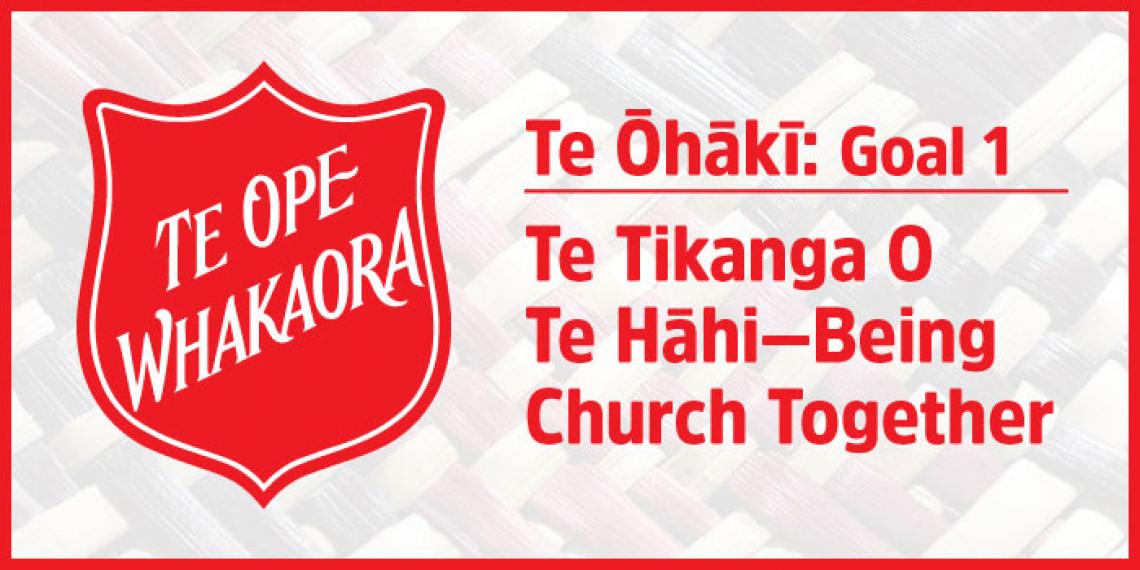You are here
Te Ōhākī: Te Tikanga O Te Hāhi—Being Church Together

Goal 1: Te tikanga o te hāhi – Being Church together
‘Our systems, policies, procedures and people reflect an intention to support tangata whenua to live out their Christian faith as Māori.’
Unuhia te rito o te harakeke kei whea te kōmako e kō
Ui mai koe ki ahau he aha te mea nui o te ao
Māku e kī atu he tangata, he tangata, he tangata!
Remove the heart of the flax bush and where will the kōmako sing?
Ask me, ‘What is the greatest thing in the world?’
I will reply, ‘It is people, people, people!’
This well-known whakatauki (Māori proverb) uses the analogy of a flax bush and people to emphasise the central importance and interconnectedness of human relationships. If people are to fulfil their God-given identity and destiny, we must cultivate them lovingly and carefully, giving them the room and resources they need to grow into who they are meant to be in Christ. This cuts to the heart of the first goal in The Salvation Army’s Māori Ministry Strategic Plan by acknowledging the importance of establishing strong, sustainable relationships (whakawhanaungatanga) and encouraging partnerships at every level within The Salvation Army.
Our systems, policies and procedures are entirely dependent on people—from the grassroots work of an individual at a corps or centre, to collective groups and departments, and right through to our most senior leaders. We want everyone to see they have a part to play in helping to implement, develop and realise this goal!
Spirituality and healthy relationships bring stability
Ko te wairua tētehi pou o te whare tapawhā. Spirituality is one of the posts that stabilises the house.
Professor Mason Durie developed Te Whare Tapawhā, a Māori model of health and wellbeing. With its strong foundations and four equal sides, the wharenui (meeting house) illustrates the four dimensions of Māori wellbeing: Te Taha Hinengaro (mental and emotional health), Te Taha Wairua (spiritual health),Te Taha Tinana (physical health), and Te Taha Whānau (relational health).
Professor Durie sees the correlation of a person and their spirituality as one dimension that needs to be strong. He says people need to be self-confident and self-assured to be healthy in mind, body and soul. If all sides of the whare are strong, so too is the person and the collective.
Nā, tēnei te mau nei te whakapono, te tūmanako, te aroha, ēnei e toru; ko te mea nui rawa ia o ēnei ko te aroha. And now these three remain: faith, hope and love. But the greatest of these is love (1 Corinthians 13:13).
This Bible verse supports Professor Mason Durie’s whakatauki. Without these three things—faith, hope and love—we are incomplete. In the same way, when people are disrespected, it is hard to maintain solid relationships.
But when a person’s faith, beliefs and values are acknowledged and respected, they will thrive, gain in confidence and excel.
Te Whare Io
Te Whare Io is a Māori discipleship programme embraced by The Salvation Army. Wānanga (schools of learning) are being held to train kaiārahi (facilitators). The aim of Te Whare Io is to:
- enable Māori to grow and be who God made them to be
- provide a safe learning environment for Māori to have confidence in Christ and being Māori, to see Māori embrace their Christian and Māori cultural identity
- provide the framework to support Māori to fulfil their mission in Christ as Māori
- meet the needs of a diverse range of Māori within Te Ope Whakaora (eg, those that have a strong faith but a weak understanding of Māori culture; those that have a strong culture but are weak in the faith; those that might be new in faith and weak in culture; and for Māori that might have shut out their culture to begin with, but have had a born-again experience and need to explore the journey of being a Christian and Māori at the same time)
- see that the ministry of The Salvation Army with Māori can grow significantly.
Native American author and educator Richard Twiss says critical contextualisation is the successful communication of the Gospel with faithfulness to the integrity and testimony of scripture in cultural situations. He believes there is no general way to communicate the teachings of Jesus that is equally understood in all cultures. This fact requires that we find distinctive avenues to present these teachings in all settings to all people.
Ideas for being church together
- identify an appropriate Māori support person for your corps/centre
- use basic greetings in the call to welcome (Kia ora tātou, nau mai, etc)
- encourage a Māori fellowship group in your centre or region
- update signage to include Te Reo Māori
- learn a benediction (eg, Kia Tau) or the Lord’s Prayer in Māori
- learn bilingual songs (The Salvation Army’s I’ll Fight CD provides some helpful resources)
- use Māori for scripture readings
- identify appropriate Māori role models/leaders and identify appropriate training for them
- identify and develop potential suitable Māori leaders
- encourage Māori representation on corps/centre leadership teams where possible
- use Te Reo Māori across corps/centre programmes where appropriate
- explore other models of worship apart from traditional Sunday morning meetings that might be more culturally appropriate.
by Trevor Mclean (c)
- Read the Māori Ministry Strategic Plan